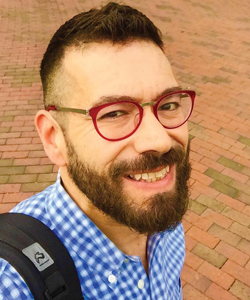Michael L. Falk - Candidate for General Councilor
Professor
Johns Hopkins University
Candidate Statement
As for many of us, APS has been my professional home since I was a graduate student. My professional path has been guided by a broad conception of physics. Exploring the interconnections between physics and other disciplines opens up myriad ways physics may be brought to bear on a broad diversity of problems. My goal in seeking this position is to foster an open, engaged, equitable, and humane physics community responsive to our role in society.
I have served as Secretary/Treasurer of the Division of Computational Physics, one of the largest divisions of APS, and as a Member-at-Large in the Group on Statistical and Nonlinear Physics. I also chaired the ad-hoc Committee on LGBT Issues in Physics that Kate Kirby commissioned to study the experiences of sexual and gender minority physicists. This work, in particular, sensitized me to the ways in which the bias against women, trans, and gender non-conforming people remains a pervasive issue in our workplaces and schools. It has been inspiring to learn that the majority of my colleagues sincerely wish to ensure that the opportunities of physics are open to all. We must be unwavering in our commitment to those who are currently marginalized, including women, LGBT, and BIPOC physicists.
In our broader quest for a more open physics, the most daunting challenge in my opinion remains how to provide equitable access to our ranks when American society continues to perpetuate gross educational inequities. In this regard, I have been active in creating outreach efforts at my own university, including two National Science Foundation-funded programs: STEM Achievement in Baltimore Elementary Schools (SABES) and Baltimore Online Algebra for Students in Technology (BOAST). While local action is essential, it is not sufficient. Organizations like APS need to be vocal advocates for equity in STEM education. We need to make sure that the narrow focus on math and literacy test preparation doesn’t continue to leave our children behind by suppressing the inspired teaching of science, particularly in under-resourced schools.
APS needs to grapple with how to effectively communicate scientific understanding to the public, particularly when political outcomes are being prioritized over evidence-based discussion. In the past, we have relied on the public’s respect for scientific authority, but arguments based on authority are not sufficiently strong to stand against the tides of the marketplace and the political winds of the day. In recent years, we have seen climate change denialism, anti-vaccine movements, and corporate greed undermine responses to a pandemic and the ecosystem of our planet. Building a strong trust relationship between science and the citizen requires us to stop relying on authority. We must draw the public into our broad deliberative community of truth-seekers. When every citizen considers themself a scientist, we will have built a bulwark against misinformation.
Educational History
- Postdoctoral Fellow, Harvard University (1998-2000)
- PhD, University of California, Santa Barbara (1998)
- MSE, Johns Hopkins University (1991)
- BA, Johns Hopkins University (1990)
URL for Full Bio or CV
Top 5 Honors, Awards, or Recognition
- Fellow, American Physical Society
- Impact Award, Materials Research Society
- Nicholas Metropolis Award, American Physical Society
- Chaire Joliot/Chaire Total, École Supérieure de Physique et de Chimie Industrielles
- Educator Award, National Organization of Gay and Lesbian Scientific and Technical Professionals
Most Recent APS Volunteer History
- Secretary/Treasurer, APS Division of Computational Physics (2018-2021)
- Chair, APS Ad-hoc Committee on LGBT Issues (2014-2016)
- Member-at-Large, APS Group on Statistical and Nonlinear Physics (2011-2014)
Membership in Other Societies
- Materials Research Society
- TMS
- American Society for Engineering Education
Other Relevant Experience
I currently serve as the Vice Dean for Undergraduate Education in the Johns Hopkins Whiting School of Engineering. Concurrent with my materials research I have pursued educational research regarding how students incorporate the learning of computation into their educational and professional development, and I have developed educational outreach programs in the city of Baltimore that seek to mitigate the factors that dissuade K-12 students from pursuing STEM educational and career pathways.

